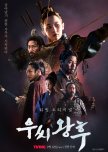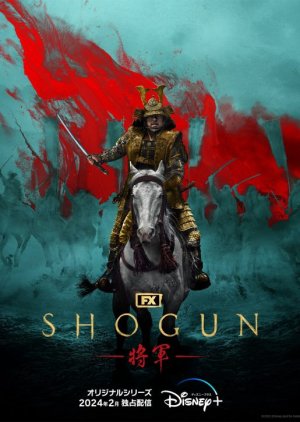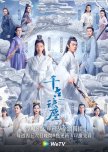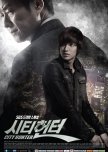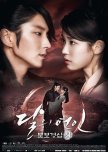
If you liked Shogun, you might also like Six Flying Dragons (SFD). Besides the obvious differences—one is a K-drama, the other an American production, and one has 50 episodes and the other 10—there are many similarities. Both are about the rise of authoritarian leaders. Like Shogun, SFD is very well written and acted out, and there is a mix of real-life and fictional characters.
However, the main difference is that SFD does not use any historical revisionism, neither character nor plot. Historical events are followed to the letter, both the glory and gore.
However, the main difference is that SFD does not use any historical revisionism, neither character nor plot. Historical events are followed to the letter, both the glory and gore.
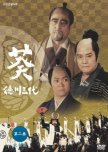
If you want to know more about Japan politics especially the conflicts after the death of Taiko, Aoi has the best depiction and it is also one of the best and comprehensive drama discussing Battle of Sekigahara, which is the final moment in Clavell's Shogun.
The difference is Aoi follows 90% of the actual history while Shogun as we know does not.
Bonus: Miura Anjin (Blackthorne) does have an appearance in Aoi
Downside:
1. Aoi is 49 episodes long and span over the 3 generations of Tokugawa
2. Aoi has low budget compared to Shogun for obvious reason
3. Aoi has old actors playing younger role
The difference is Aoi follows 90% of the actual history while Shogun as we know does not.
Bonus: Miura Anjin (Blackthorne) does have an appearance in Aoi
Downside:
1. Aoi is 49 episodes long and span over the 3 generations of Tokugawa
2. Aoi has low budget compared to Shogun for obvious reason
3. Aoi has old actors playing younger role
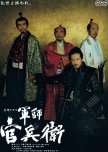
If you want to know the sentiment towards Taiko during his later years, Gunshi Kanbei has good depiction of it. This is important to understand why conflicts between Ishida and Tokugawa exist in the first place. Gunshi Kanbei is 85% following history while Shogun is 95% fiction.
Similarities: Kanbei was a Christian samurai so you will get good depiction of Japanese Christian during the time. However Kanbei character has not represented in Shogun.
Downside:
1. Gunshi Kanbei span over 50 episodes
2. Gunshi Kanbei doesn't focus much on Tokugawa (Toranaga in Shogun)
3. Gunshi Kanbei can't match the Shogun budget
Similarities: Kanbei was a Christian samurai so you will get good depiction of Japanese Christian during the time. However Kanbei character has not represented in Shogun.
Downside:
1. Gunshi Kanbei span over 50 episodes
2. Gunshi Kanbei doesn't focus much on Tokugawa (Toranaga in Shogun)
3. Gunshi Kanbei can't match the Shogun budget
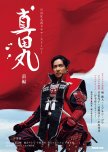
If you like Yabushige's character in Shogun, you may like Sanadamaru. This Taiga Drama shows a "sneaky" side of a samurai during the end of Sengoku Era, where they have to cleverly "switching sides" for the clan survival.
Sanadamaru also depicts the life of Taiko in his later years and how Ishida (Lord Ishido in Shogun) was desperately trying to corner Tokugawa (Toranaga) to the Sekigahara battle. The drama spans until the fall of Osaka castle.
Bonus: Ninja action, Christian depiction, Hosokawa Garcia (Mariko) appearance
Sanadamaru also depicts the life of Taiko in his later years and how Ishida (Lord Ishido in Shogun) was desperately trying to corner Tokugawa (Toranaga) to the Sekigahara battle. The drama spans until the fall of Osaka castle.
Bonus: Ninja action, Christian depiction, Hosokawa Garcia (Mariko) appearance

Similiar in that they are both international with American actors -- both feature Japanese and American actors.
Shogun is Set in Japan in the year 1600, Lord Yoshii Toranaga is fighting for his life as his enemies on the Council of Regents unite against him, when a mysterious European ship is found marooned in a nearby fishing village.
Tokyo Vice is set in 1999, American journalist Jake Adelstein has relocated to Tokyo and must pass a written exam in Japanese to have the chance to join the staff of a major Japanese newspaper. He succeeds in becoming their first foreign-born journalist and starts at the very bottom. Taken under the wing of a veteran detective in the vice squad, he starts to explore the dark and dangerous world of the Japanese yakuza whilst living under the city's official line that "murder does not happen in Tokyo".
Shogun is Set in Japan in the year 1600, Lord Yoshii Toranaga is fighting for his life as his enemies on the Council of Regents unite against him, when a mysterious European ship is found marooned in a nearby fishing village.
Tokyo Vice is set in 1999, American journalist Jake Adelstein has relocated to Tokyo and must pass a written exam in Japanese to have the chance to join the staff of a major Japanese newspaper. He succeeds in becoming their first foreign-born journalist and starts at the very bottom. Taken under the wing of a veteran detective in the vice squad, he starts to explore the dark and dangerous world of the Japanese yakuza whilst living under the city's official line that "murder does not happen in Tokyo".

Both international -- feature American and Japanese actors, with Shogun featuring other nationalities as well.
Shogun: Set in Japan in the year 1600, Lord Yoshii Toranaga is fighting for his life as his enemies on the Council of Regents unite against him, when a mysterious European ship is found marooned in a nearby fishing village.
Tokyo Vice: An American Reporter on the Police Beat in Japan is a 2009 memoir by Jake Adelstein of his years living in Tokyo as the first non-Japanese reporter working for one of Japan's largest newspapers, Yomiuri Shimbun.[1][2] It was published by Random House and Pantheon Books.[3] HBO adapted the memoir into a 2022 television series. According to Gavin J. Blair of The Hollywood Reporter, there were individuals that disputed whether certain events in the book happened as stated.[4]
Shogun: Set in Japan in the year 1600, Lord Yoshii Toranaga is fighting for his life as his enemies on the Council of Regents unite against him, when a mysterious European ship is found marooned in a nearby fishing village.
Tokyo Vice: An American Reporter on the Police Beat in Japan is a 2009 memoir by Jake Adelstein of his years living in Tokyo as the first non-Japanese reporter working for one of Japan's largest newspapers, Yomiuri Shimbun.[1][2] It was published by Random House and Pantheon Books.[3] HBO adapted the memoir into a 2022 television series. According to Gavin J. Blair of The Hollywood Reporter, there were individuals that disputed whether certain events in the book happened as stated.[4]
